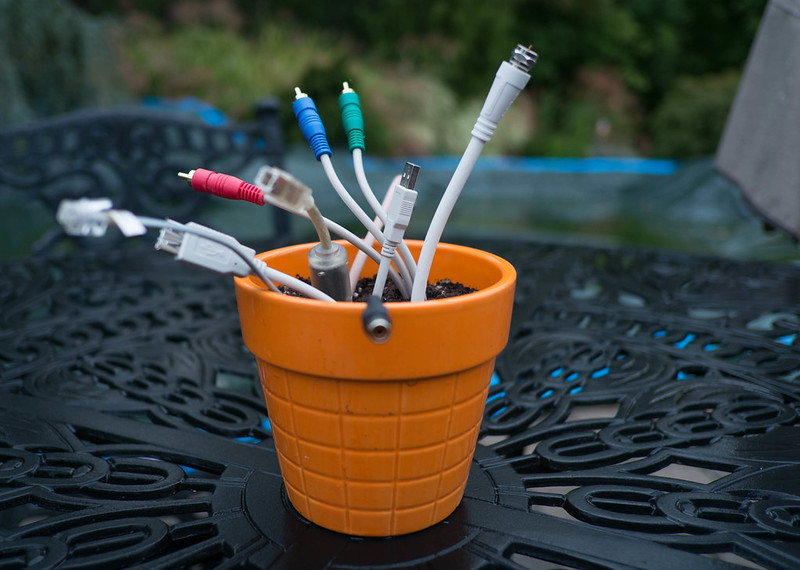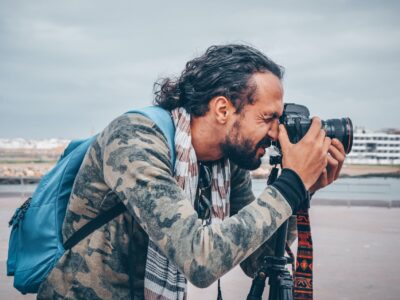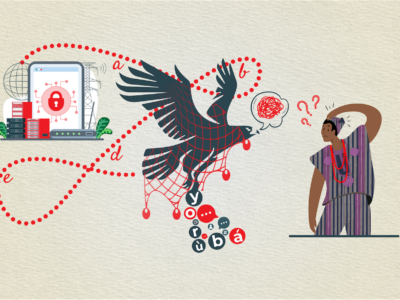RV Newsletter: Examining racial and ethnic bias in technology terminology

Photo by Nick Harris and used under a CC BY-ND 2.0 license.
Rising Voices note: Our monthly newsletter provides a summary of our recent blog posts about all aspects of digital inclusion including access and adoption of digital tools, as well as different ways and opportunities for communities to fully participate online. Read here for previous editions of this newsletter.
Hello readers, what have you been up to in August? We’ve come across a particularly insightful piece on the words we use in the world of tech and have been looking forward to sharing it with you!
Angeline Lee from Localization Lab, an organization that runs “localization sprints” to adapt different technologies and software into other languages, began this article by reminding us that words carry values. If users of technology don’t pay enough attention to the words used, then structural bias/exclusion/oppression may not be alleviated, despite the lack of ill intention. This may be especially problematic when we cross language barriers, stepping into various cultures with varying value systems.
Angeline then went on to elaborate for us on her reflection over current tech terminology, many of which may contain biased origins that might have gone unnoticed or dismissed by their users — blacklist vs. whitelist, for example. Along with her keen observation, she also urged tech stakeholders to assume leadership in changing the status quo by striving for alternatives that are more unbiased, appropriate for all — such as +/- connectors for male/female connectors
Angeline added, “Language and culture are intrinsically connected, reflecting societal norms and its values.” Shall we, therefore, all strive to be more mindful of our daily languages — and make necessary shifts as we go — on our collective journey to inclusion?
MORE FROM THE RISING VOICES BLOG
Following our commemoration of the International Year of Indigenous Languages (#IYIL19), Rising Voices and our partners are continuing a series of rotating Twitter campaigns based off last year’s successful initiative. If you are curious about indigenous, minority, endangered, or under-resourced languages across the world plus how the internet and technology may play a role in their promotion and/or revitalization, please stay tuned! You can also read the profile posts as follows to learn more about our recent hosts, their work and visions for their languages.
@AsiaLangsOnline (Asia)
- Rany Phok on the current status of the Krung language, spoken in Ratanakiri Province in northeastern Cambodia, as well as her quest in navigating between community identity and the preservation of its language through filmmaking
- Noor Pamiri on his mother tongue Wakhi — a language spoken in four countries, yet deemed as “definitely endangered” by UNESCO, with no standardized script– and his dedication to its preservation as well as revitalization
Along these lines, we invite you to read excerpts from an interview with Dr. Túndé Adégbọlá from Nigeria (republished from Guest Contributor Kọ́lá Túbọ̀sún from his Medium page). Find out more on how language & technology can help bridge “the last six inches” in closing the digital divide in the context of Africa. → “Túndé Adégbọlá's work bridges “the language gap of the digital divide for Africa” through technology”
In this issue, we would also like to highlight an interview with Andrés Tapia, communications director at Confeniae, an NGO that has helped shed light upon the impact of COVID-19 across Ecuador's Amazonian communities and how they are taking an active role in identifying much needed assistance and services in these areas. → “Ecuador's indigenous Amazonian peoples launch online COVID-19 tracker”
FUNDING
Working on documentaries involving international co-productions between European and non-European producers? The IDFA Bertha Fund wants to support projects falling into its IBF Europe – Distribution of International Co-productions category in reaching a global audience through innovative distribution plans (details here). Application due: October 1, 2020
CALLS FOR PARTICIPATION
Are you based in the U.S. and have insights regarding disability and accessibility in the country? The New York Times is seeking your input to help them shape their reporting in this realm. Please see their open call here as to how you may partake in this.
UPCOMING EVENTS & CONFERENCES
Rising Voices, in collaboration with the Canadian Embassy in Mexico, will be hosting the fourth and final session of our online exchange series on leveraging technology and the Internet for language revitalization. Come join indigenous language activists of both regions to learn more (event/registration details here [en] [es])! Date: September 8, 2020 at 11am (CDT/Mexico City)
ADDITIONAL READINGS, LISTENINGS, and VIEWINGS
- Sharing Indigenous Cultural Heritage Online: An Overview of GLAM Policies – Creative Commons via Creative Commons
- Ethics & responsibilities of open access. Lessons learnt from the Wikipedia project of the Atikamekw as shared by Culture Mondial via YouTube
- Between Regulation and Rights: Empowering the Citizen through Media and Information Literacy via MILEN
- How to center disability in the tech response to COVID-19 via Brookings
- Could digital exclusion in payments be a barrier to a COVID-free society? via Global Banking & Finance Review
Subscribe to the Rising Voices Newsletter
Support our work
Since Rising Voices launched in 2007, we’ve supported nearly 100 underrepresented communities through training, mentoring, microgrants and connections with peer networks. Our support has helped these groups develop bottom-up approaches to using technology and the internet to meet their needs and enhance their lives.
Please consider making a donation to help us continue this work.



